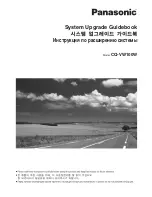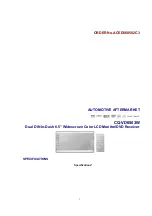
Important Information
Important Battery Information
• Remove the batteries to avoid leakage if you
do not use your remote control for more than
one month.
• Discard leaky batteries immediately as leaking
batteries may cause skin burns or other
personal injuries. Dispose of batteries in the
proper manner, according to provincial and
local regulations.
• Any battery may leak electrolyte under the
following circumstances:
- if mixed with a different battery type,
- if inserted incorrectly,
- if all batteries are not replaced at the same
time,
- if disposed of in fire, or
- if an attempt is made to charge a battery not
intended to be recharged.
Headset Safety
• Do not play your headset at high volume.
Hearing experts warn against extended high-
volume play.
• If you experience ringing in your ears, reduce
volume or discontinue use.
• You should use with extreme caution or
temporarily discontinue use in potentially
hazardous situations.
Even if your headset is an open-air designed to
let you to hear outside sounds, do not turn up
the volume so high that you are unable to
hear what is around you.
Caution While Driving
Use of headphones while operating an
automobile or moving vehicle is not
recommended and is unlawful in some states and
areas. Be careful and attentive on the road. Stop
operation of the unit if you find it disruptive or
distracting while driving.
Don’t Infringe
This product should only be used for the purposes
for which it is sold, that is, entertainment,
violating no copyright law. Any attempts to use
this product for which it is not intended is
unlawful and therefore not condoned by
Thomson.
This symbol means that your
inoperative electronic appliance must
be collected separately and not mixed
with the household waste. The
European Union has implemented a
specific collection and recycling
system for which manufacturers are responsible.
This appliance has been designed and
manufactured with high quality materials and
components that can be recycled and reused.
Electrical and electronic appliances are liable to
contain parts that are necessary in order for the
system to work properly but which can become a
health and environmental hazard if they are not
handled or disposed of in the proper way.
Consequently, please do not throw out your
inoperative appliance with the household waste.
If you are the owner of the appliance, you must
deposit it at the appropriate local collection point
or leave it with the vendor when buying a new
appliance.
• If you are a professional user, please follow
your supplier's instructions.
• If the appliance is rented to you or left in your
care, please contact your service provider.
Help us protect the environment in which we
live!
EN
CS196 EN 17/2/06 7:28 PM Page 7





































